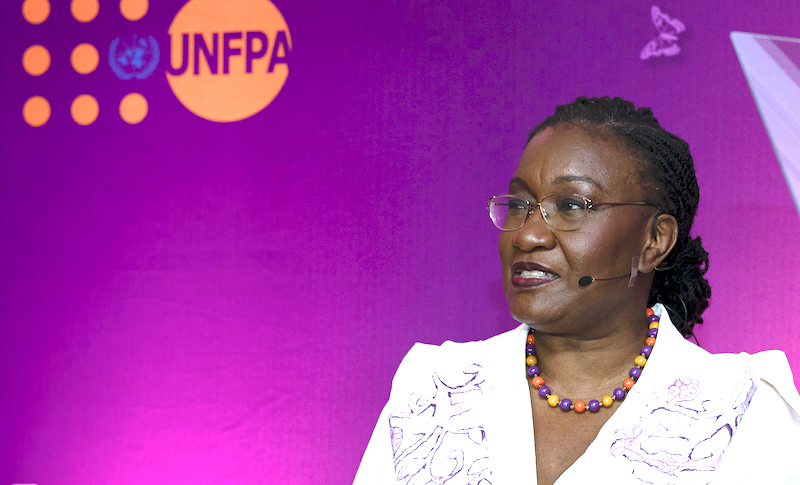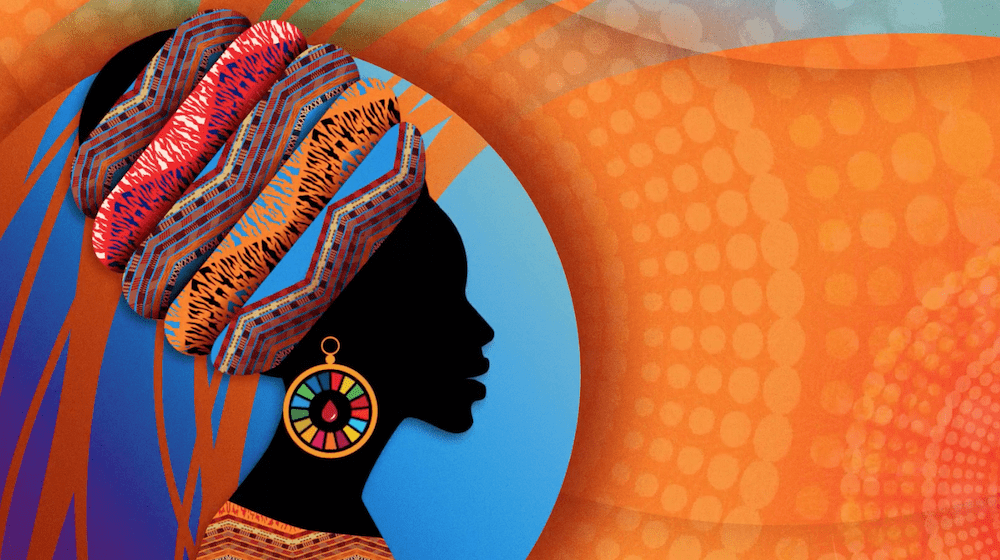JOHANNESBURG, South Africa—We need to have open conversations about menstrual health and to prioritize the integration of this naturally occurring process into mainstream education, said Dr. Mashela Mogaila Mokgabudi, a Lead for the Africa Coalition on Menstrual Health Products.

Speaking at the recent Africa Symposium on Menstrual Health 2023, she said that by making different products available and affordable, and by addressing inclusivity and cultural considerations, we can ensure no one is left behind. She also called for a stronger focus on the development of standards for products to ensure quality, choices and reliability.
The virtual event was organized by the Africa Coalition on Menstrual Health (ACMH) with support from UNFPA, the United Nations sexual and reproductive health agency. It brought together more than 500 participants from UN agencies, governments, development partners and youth networks across Africa to discuss the latest challenges and opportunities in menstrual health.

On the issue of period poverty, Lydia Zigomo, Regional Director for UNFPA East and Southern Africa, stressed that since 2018, there has been notable progress in some countries towards tax exemption on menstrual products. Girls, women and all people who menstruate require access to climate-friendly products, and they must be able to access these products in spaces that are free from exploitation and violence.
In humanitarian settings, UNFPA works to ensure that menstrual health products are a standard component of dignity kits. UNFPA is committed to ensuring that all should experience healthy menstruation, with dignity and pride and in comfort and achieve their potential and live healthy lives, she said.

Emma Theofelus, Namibia’s Deputy Minister of Information, Communication and Technology, said the notion of menstruation and menstruators as being “dirty” is one that has been internalised by many groups in society. For this reason, menstruation remains a difficult topic to discuss.
“An interesting contradiction is that we celebrate the birth of babies but fail to realise that it begins with menstruation. Discussions on menstruation must begin at the household level and move into policy spaces,” she said.

Gloria Orwoba, Kenya’s Senator for Women, told the story of when she was asked to leave the chambers during a sitting of Parliament because of a noticeable stain on her trousers while menstruating. A video of her rebuking her fellow Members of Parliament for period shaming her subsequently went viral, and discussing menstruation in Parliament has since become normal.
She urged for menstruation to be prioritized as a health and rights issue, and called for investments in menstrual health programmes and services so that all girls and women can live healthy and productive lives.
Dr. Venkatraman Chandra-Mouli, WHO Geneva, said programmatic responses to menstrual health must take a life course view from before menarche to after menopause. The integration of menstrual health into programmes and policies is crucial. Moreover, comprehensive sexuality education is effective in promoting menstrual health, and should be adapted to local contexts and languages, and also consider local power structures to be effective, he added.
Key points that emerged during the event include the following:
- Menstrual stigma: Menstrual stigma is a major challenge that prevents girls, women and other people who menstruate from accessing the care they need. This can lead to girls feeling ashamed of their periods, and can prevent them from talking about their menstrual health with their families, friends and health-care providers.
- Menstrual health education: There is a need for more comprehensive menstrual health education in Africa. This should cover topics such as menstruation, puberty, menstrual hygiene and reproductive health.
- Menstrual health policies: There is a need for more comprehensive menstrual health policies and programmes on the continent. These should address issues such as access to sanitary products, menstrual stigma, taboos, norms and menstrual health education.
- Access to sanitary products: A key challenge is the lack of access to sanitary products for many girls, women and other people who menstruate in Africa, and this is exacerbated in humanitarian contexts. It can lead to girls missing school, experiencing pain and discomfort, and being at risk of infection.
In addition, the following points were raised:
- The need to address the issue of period poverty, which is a major barrier to menstrual health for many girls, women and people who menstruate in Africa.
- The importance of involving men and boys in conversations about menstruation, in order to challenge menstrual stigma and promote gender equality.
- The need to develop innovative solutions to address the challenges of menstrual health in Africa, such as the development of new menstrual products and the use of technology to improve access to information and services.
- Africa-based and led research for menstrual health integration should be prioritized, and more Africa-based researchers need to be engaged.
Working together

Mahamat Seid Farah, Secretary-General for Chad’s Ministry of National Education and Civic Promotion, discussed the importance of dialogue between parents and children, especially young girls and adolescents during the first menstrual period. In Chad, Life and Reproductive Health Education has been integrated into the school curricula; this also takes into account the refugee population in Chad, as schools in refugee camps follow the Chadian curriculum.
The symposium ended with a reiteration of the next steps:
- Challenge menstrual stigma and promote menstrual health education.
- Develop and implement comprehensive menstrual health policies.
- Increase access to affordable and quality sanitary products for all girls, women and other people who menstruate in Africa.
The event was a significant step forward in the fight for menstrual health in Africa. The commitments made will help to ensure that all girls and women in Africa have access to the care they need to live healthy and productive lives.


